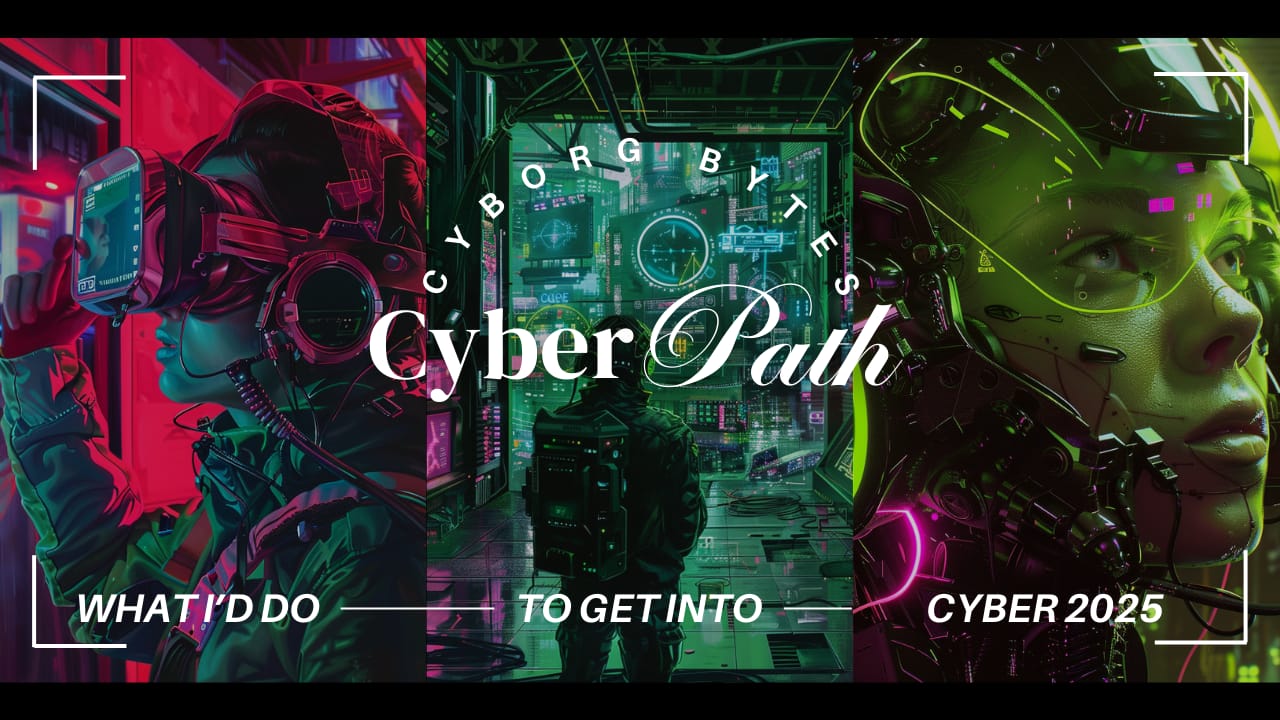- Cyborg Bytes
- Posts
- What I'd Do DIFFERENTLY to Learn Cybersecurity in 2025
What I'd Do DIFFERENTLY to Learn Cybersecurity in 2025

They Lied to You About Cybersecurity
If I were starting cybersecurity in 2025, I’d ignore 90% of the advice out there.
College degrees. Certifications. Job boards.
They made it sound like there was a clear path. But after 15 years in the military, DOJ, private sector, freelance, and consulting, I can tell you: the whole system is broken.
Not in a conspiracy-theory way. In a crying-in-a-windowless-SCIF wondering if I’ll ever belong kind of way.
The path we were sold? It doesn’t exist anymore. Not for the neurodivergent or “DEI”. Not for the burned out. Not for the self-taught rebels trying to make this work without selling their soul.
You've probably heard all the "good advice":
Get a degree.
Stack certs.
Apply to 100 jobs.
Grind in Discord servers.
Network like your life depends on it.
And yet you’re still invisible. Still stuck. Still wondering what you’re doing wrong.
The truth is: the rules changed. But no one updated the instructions.

Why Most Cyber Career Advice is Useless in 2025
Let’s talk about what’s actually happening in the industry right now.
A third of job listings are fake.
Most resumes don’t touch human hands.
Recruiters ghost more than they respond.
Hiring pipelines are full of AI filters and keyword matching.
Entire departments are being outsourced quietly, with no warning.
You can do everything “right” and still get left on read.
The people giving you advice? Most of them haven’t applied to a job since Windows XP. They’ll tell you to hustle harder or get another cert—but the system doesn’t reward that anymore.
The old ladder is broken. Stability is gone. Cybersecurity has shifted from being a predictable career path to a rigged machine—and if you don’t adjust your strategy, it’ll eat you alive.
That’s where this roadmap comes in.
Because I’m not here to help you “get hired.” I’m here to help you take ownership.
Not by playing the game harder. But by changing how you play altogether.
What I’d Do Differently If I Were Starting Cybersecurity in 2025
If I were starting from scratch—no certs, no connections, no clue—here’s exactly what I’d do.
This isn’t wishful thinking. This is the system I built after 15 years deep in military ops, federal teams, startups, creator life, consulting, and the weird in-between zones where nobody teaches you how to navigate.
Most people stay stuck because they’re chasing someone else’s playbook. A broken one. They burn time and money on certs they don’t need, try to memorize everything, or copy a career that doesn’t even fit how they think.
If that’s you—it’s not your fault. But it is your responsibility now. So here’s what works in 2025.
1. Pick a Niche That Matches How Your Brain Works
Cybersecurity is massive. It’s not a job—it’s a hundred wildly different roles. There’s no single “entry-level” door, and the longer you treat it like a one-size-fits-all ladder, the longer you stay stuck.
You don’t need to pick the perfect job, but you do need direction. Otherwise, you’ll waste months trying to make your brain behave in a space that drains it.
Ask yourself:
Do I like structure or freedom?
Do I prefer patterns or people?
Do I want to break things or protect them?
Do I need fast feedback or deep focus?
Start there. Cross off what you hate. That’s data. That’s how you stop following paths that weren’t built for you.

2. Build a Second Brain Before You Ever Touch a Cert
You won’t remember 90% of what you learn. Full stop.
When I started, I had notes in twelve different places. Half-finished labs. Five browsers with a thousand bookmarks. Every day felt like starting from scratch.
What I needed wasn’t more information. I needed a system to keep what mattered.
So I built a second brain—a personal knowledge base that stored commands, walkthroughs, fixes, cheat sheets, and “I always forget this” gotchas. Taggable. Searchable. Built for how I think. All in one place
Here’s the rule: everything I learn goes in.
That one habit turned me from scattered to dangerous. Not because I knew everything—but because I stopped forgetting what I’d already learned.
3. Learn in Public. Teach Two Steps Behind.
If I waited until I felt “ready” to post anything, I’d still be waiting.
Cybersecurity rewards people who show their process. Not experts. Not gurus. People who say: “Here’s what I learned. Here’s what tripped me up. Here’s how I got through it.”
That’s what builds trust. That’s what gets you noticed. That’s what gets you hired.
Write up your labs. Share your notes. Explain new concepts like you’re talking to a friend. You’re not showing off—you’re building proof of momentum.
And when someone smarter corrects you? That’s a free upgrade to your brain.
4. Stop Chasing Certs. Start Doing Labs That Mirror Real Jobs.
Certs don’t get you hired. Projects do.
I’ve seen candidates with five certs and zero hands-on work get passed over by someone with one lab write-up that matched the job perfectly.
If I were starting again, I’d pick one high-leverage cert—probably Security+—and then I’d pull five job listings I actually want.
Then I’d reverse-engineer them:
What skills show up most? What tools? What tasks?
And I’d go build projects that show I can already do that work.
Not perfect. Not pretty. But specific and real.
That’s how you move from “qualified” to “obvious hire.”
5. Build a Leverage Bank From Day One
Most people build skills and walk away empty-handed.
Every time you create something—notes, diagrams, labs, tutorials, fixes—you’re making assets. But only if you save them somewhere you control.
I call this your Leverage Bank.
It’s the body of work that stays with you when the job ghosted you, the contract ended, or the cert expired.
You can reuse it. Teach from it. Reference it in interviews. Build content with it. Sell it later. It’s yours. It compounds.
This is how you start building equity in your own name—not just making someone else’s org chart look good.
TL;DR: The Modern Cybersecurity Starter Stack
If I were starting again today, here’s what I’d do—no fluff:
Pick a niche based on how your brain works
Build a second brain to retain and reuse what you learn
Learn in public and teach what confused you yesterday
Do labs that mirror real jobs, not random challenges
Save everything in a leverage bank that compounds over time
That’s the system.
It’s not about being perfect.
It’s about building momentum you actually own.

Why the System Is Rigged—And Why You’re Not the Problem
If you’ve been applying to cyber jobs and hearing nothing back…
If you’ve got certs and still feel invisible…
If you’re doing “everything right” and nothing’s clicking—
You’re not crazy.
You’re not broken.
You’re not too late.
You’re just stuck in a system that was never designed to help you win.
The Job Boards Are Lying to You
You’ve seen it: job after job, all asking for a unicorn with 5 years’ experience in 15 tools for $60K and free pizza.
But here’s what no one tells you:
A lot of these listings? They’re fake.
Companies post “open” roles they aren’t hiring for. Sometimes to collect resumes. Sometimes for compliance. Sometimes to cover the fact they’re quietly laying people off.
You spend hours tweaking resumes and writing cover letters for jobs that were never real to begin with.
And the ones that are real?
Your resume gets scanned by a bot before a human even sees it.
This system wasn’t built for you to win. It was built to filter you out.

The Myth of Job Stability Is Just That—a Myth
In the U.S., your job is your health insurance. Your housing. Your identity.
But “job stability”? It doesn’t exist.
Companies drop people with zero warning.
They automate jobs mid-sprint.
They reorganize you out of a paycheck while talking about “strategic alignment.”
And if you’re neurodivergent? Multiply that stress by 10.
These systems reward fake urgency, constant context switching, and shallow performance theater.
I tried to play the game. I showed up to the meetings. I masked. I burned myself out trying to meet expectations designed by people who don’t think like me.
And when I cracked under the pressure, they called it a “resilience issue.”
It’s not a you problem.
It’s a system problem.
It’s far better to aim to eventually work for yourself and use jopbs as stepping stones to your own thing.
You’re Not Underqualified. You’re Playing in a Rigged Casino.
So if you’ve been studying, building, applying—and still getting nowhere?
It’s not because you’re not good enough.
It’s because the system benefits from keeping you confused, isolated, and waiting for permission.
The fix isn’t grinding harder.
It’s building leverage.
That’s the next chapter: how visibility, ownership, and learning out loud can flip the entire dynamic.

What If the Fastest Way Into Cybersecurity Is Becoming a Thought Leader?
I know. That phrase makes most people flinch.
“Thought leader.”
It sounds like influencer nonsense.
But I’m not talking about building a brand or going viral.
I’m talking about becoming visible—on purpose.
Because in 2025, being qualified isn’t enough.
The people who get hired, referred, and remembered aren’t always the smartest.
They’re the ones who’ve shown their process in public.
That visibility? It builds trust before you ever apply.
Why Visibility > Credentials
The hiring game has changed.
Your resume? It’s filtered by AI.
Your certs? They’re table stakes now.
But when you post a breakdown of a lab you did—or a cheat sheet you made—or explain a concept in your own words?
You’re doing three powerful things at once:
Reinforcing your own learning
Showing you can communicate clearly
Giving people a reason to remember you
And it doesn’t take a huge following.
Even ten solid posts can change your trajectory.
I’ve seen it firsthand:
Clients and students getting interviews from strangers who liked a LinkedIn post or GitHub commit.
Because when someone Googles you and finds real thinking—not just a resume—you stand out.
“But I’m New. What Do I Even Say?”
That’s actually your superpower.
Most experts are terrible at teaching beginners.
They forget what it was like to be confused. You haven’t.
So teach two steps behind you.
You’re not faking authority—you’re showing curiosity. That’s magnetic.
Here’s what that might look like:
“Here’s a mistake I made and what I learned”
“I couldn’t find a beginner guide to [topic], so I made one”
“Just finished [thing]—here’s what tripped me up”
Don’t overthink it. Don’t wait for perfection.
This isn’t about ego.
It’s about proof-of-work.
You Don’t Need to Be Loud. You Just Need to Show Up.
I get it.
Putting yourself out there feels risky. You worry about being wrong. You worry no one cares.
But staying invisible is worse.
You don’t need to be confident. You just need to be present.
Even if it’s awkward. Even if it’s messy.
The people you want to meet—mentors, collaborators, hiring managers—they’re not digging through job boards.
They’re watching the feed.
Give them something to find.

I Built Cyber Zero to Hero Because Everyone Kept Asking Me the Same Damn Thing
Every week—hell, every day—I was getting hit with the same question:
“How do I actually get into cybersecurity?”
I got this question 10 to 15 times a day, from people who were motivated as hell but stuck in a fog of bad advice, dead-end certs, and job boards that led nowhere.
So I took everything from my own leverage bank—the systems I used, the tools I created, the exact strategy that got me out of burnout and into $250K+ offers—and I built a course that maps it all out.
It’s called Cyber Zero to Hero, and it’s designed to give you a full, no-BS blueprint to break into cybersecurity—even if you’re starting from absolute zero.
Inside it, you’ll get:
✅ A custom niche assessment to find the perfect cyber role for your brain
✅ A done-for-you second brain template to keep track of everything you learn
✅ Hands-on labs that mimic real job tasks—without needing a job first
✅ Tools to build your skill + brag file from Day One
✅ The exact scripts, prompts, and personal branding strategy I used to get recruiters reaching out to me
It’s everything I wish someone had handed me on day one—especially when I was crying in a SCIF thinking I’d never belong in this field.
So if you’re tired of spinning your wheels, and you’re ready to stop guessing and start building something real?
Now let me tell you what I wish someone had told me in year one…
What I Wish Someone Had Told Me in Year One
If I could go back to the very beginning—day one of my cybersecurity career—these are the things I wish someone had told me. Not the textbook advice. Not the cheerleading. The real stuff. The human stuff. The stuff that would’ve saved me years of burnout, self-doubt, and second-guessing.
Because the first year is where most people quit. Not because they’re not smart enough. But because no one ever taught them how to survive the transition from “I’m curious” to “I belong here.”
Let’s fix that.

1. Lean Into Being a Beginner
You get one shot at this phase: when it’s expected that you don’t know what you’re doing. Use it.
Ask every “dumb” question. Raise your hand even when you're not sure. Admit when you’re confused. It’s not a weakness—it’s magnetic. People want to help someone who’s genuinely trying.
I spent too long pretending I understood. All it did was slow me down.
2. Volunteer to Take Notes in Meetings
Even if you’re totally lost—especially if you’re lost.
You’ll pick up lingo, workflows, patterns. You’ll start to connect dots faster than you think. You’ll quietly become indispensable.
I built trust early in my career just by doing this one thing. People assumed I was way more technical than I was—because I could summarize the conversation. Context is currency.
3. You’re Supposed to Feel Overwhelmed
Cybersecurity isn’t one skill. It’s a universe.
You will feel behind. You will feel like you’re not cut out for it. That’s normal.
This path isn’t clear at the start. You don’t need a 10-year plan. You just need to take the next step—one messy lab at a time. The next thing will reveal itself. But only if you keep moving.

4. Studying Without Action Is Wasted Motion
I read for months before I built anything. Total mistake.
You don’t need 10 PDFs. You need to break something, fix it, and write down what you did. Action is the only way to build real understanding.
If you’re not applying it, you’re just hoarding info—and that’s not learning. That’s procrastination.
5. Keep a Skill File and a Brag File
Every time you learn something new—even if it feels small—write it down.
Used grep for the first time? Skill file.
Wrote a regex? Skill file.
Got a “great job” in Slack? Brag file.
These become your ammo for job apps, interviews, and fighting imposter syndrome. When your brain says “You’re not progressing,” your files will say otherwise.
6. Teach Everything Two Steps Behind You
You don’t need to be an expert. You just need to share what you’ve figured out.
Write a note, record a video, sketch a diagram. Explain what confused you and how you solved it. Not for likes—for clarity. For retention. For someone else who’s struggling, too.
7. Get Used to Being Seen
You don’t need to be loud or perfect. But you do need to show up.
Post your progress. Share what you’re working on. Ask for help in public. Visibility builds opportunity. It builds your network, your confidence, and your reputation—even before you feel ready.
No one is coming to save you. But people will show up for you the second you show up for yourself.

You Don’t Need to Be Perfect—You Just Need a System
You don’t need to be a prodigy. Or memorize every tool. Or feel confident every second of the day.
You just need a system. One that works with your brain and reality—not against it.
Cybersecurity isn’t about becoming some elite hacker who can quote every port number from memory. It’s about building sovereignty. Over your skills. Your time. Your future.
That starts with structure.
Not hustle. Not perfection. Just repeatable moves that compound over time.
Here’s what that looks like:
Pick a niche that fits how your brain works
Build a second brain so nothing gets lost
Do labs that mirror real job tasks
Learn in public—two steps behind is enough
Capture everything in a leverage bank that grows with you
That’s it. That’s the system I wish someone had handed me on Day One.
You Don’t Have to Figure It Out Alone
I built this system because I needed it.
I needed it when I was crying in a SCIF wondering if I was too dumb to learn cyber.
When I dropped out of a PhD program that felt like a lie.
When recruiters ghosted me and job listings dried up.
When I realized no one was coming to hand me a blueprint that made sense.
So I built my own.
And now? That system has helped others—especially the ones who’ve been burned out, boxed in, or left behind by the traditional path.
You don’t need to walk that same path to earn your way in.
You need a strategy that matches your brain, your values, and your goals.
If you’re ready for that—
If you’re done with the hamster wheel and ready to build something that belongs to you—
You know what to do.
Take the next step. Not because you need to be saved. But because you’re ready to build something that actually lasts.
Sovereignty over survival. That’s the move.
Stay Curious,
Addie LaMarr